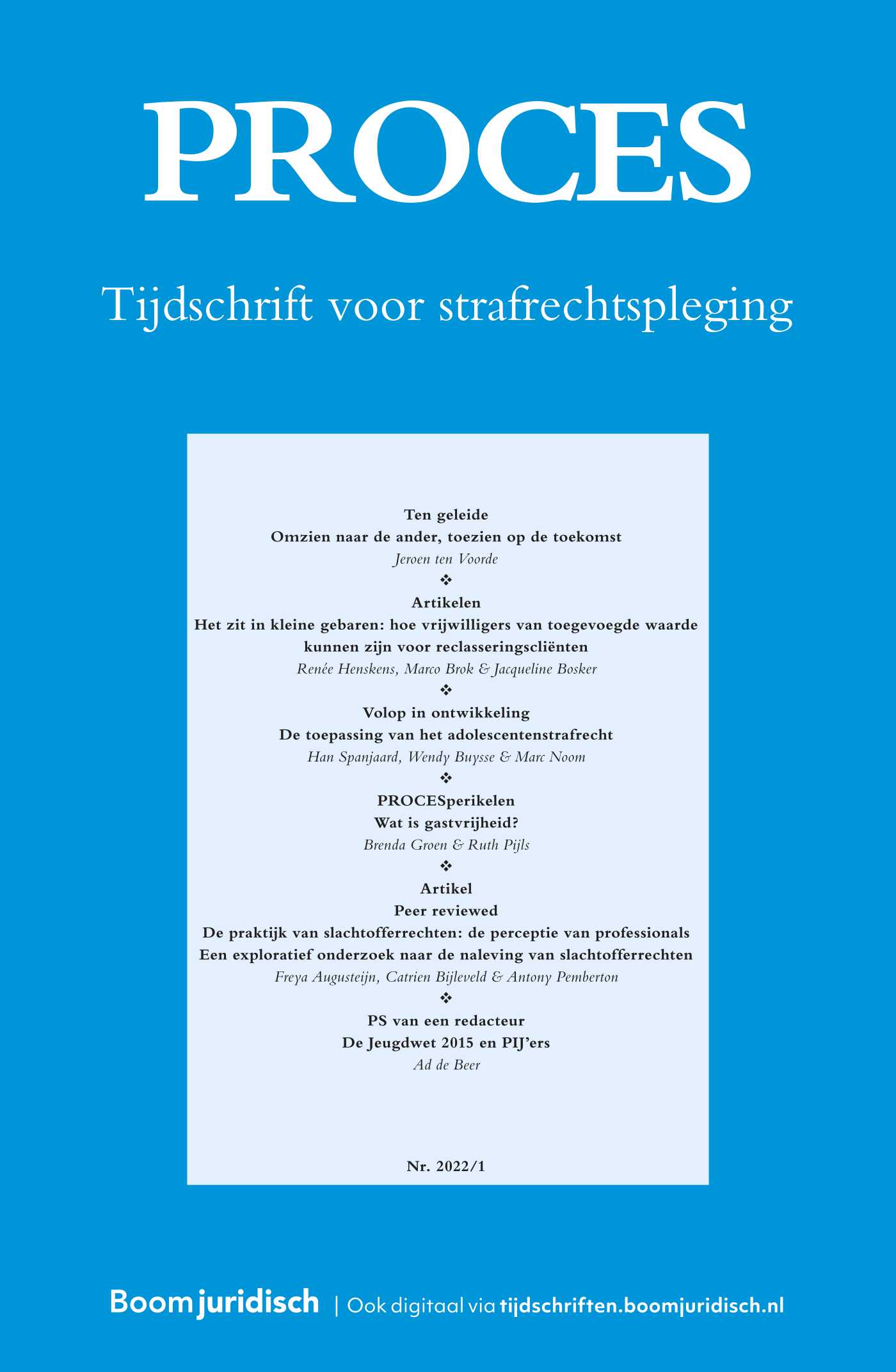|
The aim of the current study is to provide insight in the support for victim rights among Dutch citizens. Although it is generally assumed that the Dutch public supports these rights, empirical research into this topic appears to be scarce. The opinion with regard to four victim rights was established in two ways. Firstly, respondents were asked about their attitudes and, secondly, about their willingness to pay extra taxes for those rights. Respondents’ attitudes concerning the victim rights in this study appear to be positive; their willingness to pay, however, is low. Findings indicate the importance of combining conventional attitude questions with alternative methods (such as questions about willingness to pay) when studying public preferences and opinions. |


PROCES
Meer op het gebied van Criminologie en veiligheid
Over dit tijdschriftMeld u zich hier aan voor de attendering op dit tijdschrift zodat u direct een mail ontvangt als er een nieuw digitaal nummer is verschenen en u de artikelen online kunt lezen.
| Redactioneel |
Profileren en selecteren binnen de strafrechtspleging |
| Auteurs | Mr. dr. Maartje van der Woude |
| Auteursinformatie |
| Artikel |
Het slachtoffer centraal?Opinie ten aanzien van slachtofferrechten in Nederland |
| Trefwoorden | opinie over slachtofferrechten, slachtofferrechten in Nederland, attitudes, willingness to pay |
| Auteurs | Dr. Karlijn F. Kuijpers, Sanne van Parera en Lieke Popelier |
| SamenvattingAuteursinformatie |
| Artikel |
Een herstelgerichte benadering van delinquenten met een psychische stoornis |
| Trefwoorden | resocialisatie, psychisch gestoorde delinquenten, herstelrecht, actieve verantwoordelijkheid |
| Auteurs | Prof. dr. Frans Koenraadt en Mr. dr. Renée Kool |
| SamenvattingAuteursinformatie |
|
Today’s risk based criminal justice policy leaves but little room to tune sentencing decisions to the individual offender’s mental capacities. As a result, sanctioning has become one-sided, being directed towards retribution. However, in the long run such a non-reciprocal concept of sanctioning, implying a denial of the need to facilitate rehabilitation, weakens the social fabric. Moreover, it holds a denial of citizenship towards (mentally ill) offenders. For the past decades, restorative justice has offered alternative solutions to deal with delinquency. Using informal procedures, taking into account peculiarities of the case, including the offender’s mental capacities, offenders are invited to take accountability for wrongful acts. A similar approach has been introduced within the field of mental health services, including the sector of the forensic mental health care. In response to the popular social biological model, a model of restorative treatment has been introduced, implying treatment to be directed towards reintegration, requiring active participation of the patient/offender. Bearing in mind the communalities between both models, we explore the potential of such a restorative citizenship based approach to better the integration of mentally disturbed offenders. |
| Praktijk |
Digitalisering maakt strafrechtspraktijk kleurig. Met alle onbekende gevolgen van dien |
| Auteurs | Dr. Gabry Vanderveen en Dr. Lotte van Dillen |
| Auteursinformatie |
| Artikel |
Van je familie moet je het hebbenEen onderzoek naar de werking van preventief beleid in de derde pijler van de Top 600-aanpak van de gemeente Amsterdam |
| Trefwoorden | Top 600-aanpak, Amsterdam, derde pijler, preventiefuik |
| Auteurs | Drs. Hugo Aalders, Drs. Bas Kurvers, Mr. Monique Mos e.a. |
| SamenvattingAuteursinformatie |
|
Prevention is very difficult to evaluate. If the situation you are trying to avoid, does not occur, it is likely to continue with prevention. If the situation does occur, it is logical to continue with the already taken preventive measures or even intensify these. This is what we call the ‘prevention trap’. In the first part of the article, a framework is presented for a methodological way to test policy on signals of the presence of a ‘prevention trap’. In the second part this framework is applied on the way the city of Amsterdam is dealing with the brothers and sisters of the top 600 criminal offenders, in the so called ‘Top 600 approach’. Some conclusions are drawn. |
| Column |
Tbs’ers en autisten bestaan niet |
| Auteurs | Dr. Jaap A. van Vliet |
| Auteursinformatie |
| Diversen |
Studiedag van PROCES 13 december 2013Profileren en Selecteren binnen de Strafrechtspleging:Efficiëntie of Discriminatie? |
